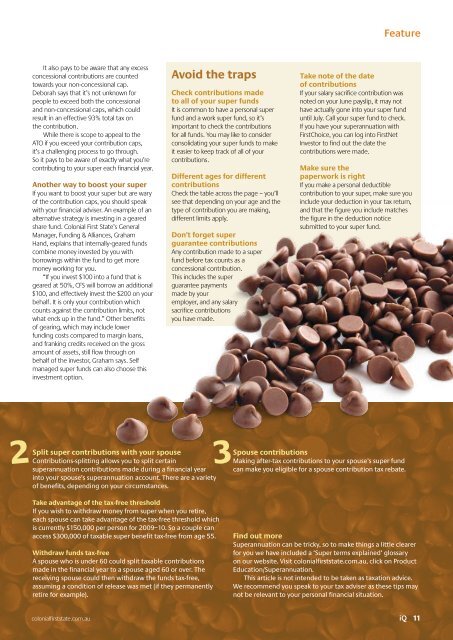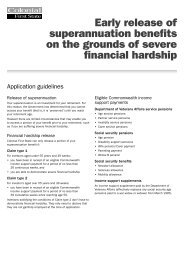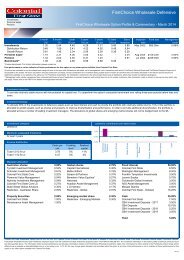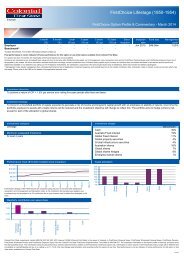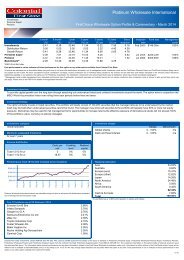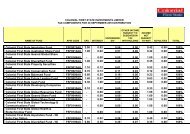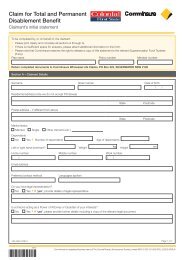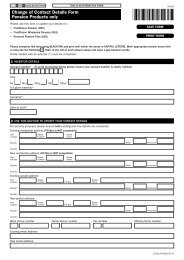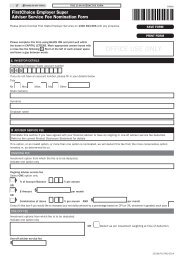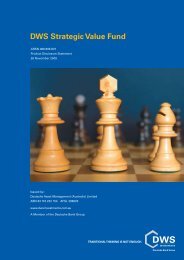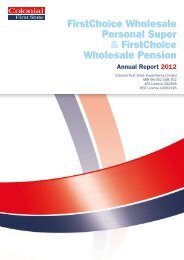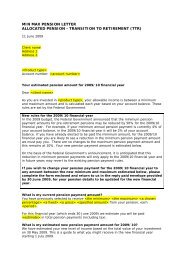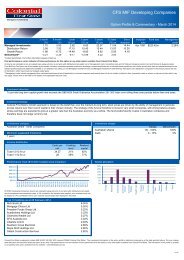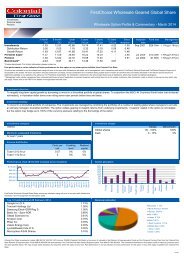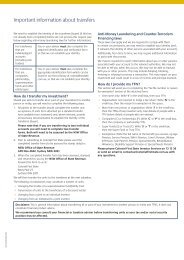Life after the Global Financial Crisis - Colonial First State
Life after the Global Financial Crisis - Colonial First State
Life after the Global Financial Crisis - Colonial First State
Create successful ePaper yourself
Turn your PDF publications into a flip-book with our unique Google optimized e-Paper software.
FeatureIt also pays to be aware that any excessconcessional contributions are countedtowards your non-concessional cap.Deborah says that it’s not unknown forpeople to exceed both <strong>the</strong> concessionaland non-concessional caps, which couldresult in an effective 93% total tax on<strong>the</strong> contribution.While <strong>the</strong>re is scope to appeal to <strong>the</strong>ATO if you exceed your contribution caps,it’s a challenging process to go through.So it pays to be aware of exactly what you’recontributing to your super each financial year.Ano<strong>the</strong>r way to boost your superIf you want to boost your super but are waryof <strong>the</strong> contribution caps, you should speakwith your financial adviser. An example of analternative strategy is investing in a gearedshare fund. <strong>Colonial</strong> <strong>First</strong> <strong>State</strong>’s GeneralManager, Funding & Alliances, GrahamHand, explains that internally-geared fundscombine money invested by you withborrowings within <strong>the</strong> fund to get moremoney working for you.“If you invest $100 into a fund that isgeared at 50%, CFS will borrow an additional$100, and effectively invest <strong>the</strong> $200 on yourbehalf. It is only your contribution whichcounts against <strong>the</strong> contribution limits, notwhat ends up in <strong>the</strong> fund.” O<strong>the</strong>r benefitsof gearing, which may include lowerfunding costs compared to margin loans,and franking credits received on <strong>the</strong> grossamount of assets, still flow through onbehalf of <strong>the</strong> investor, Graham says. Selfmanaged super funds can also choose thisinvestment option.Avoid <strong>the</strong> trapsCheck contributions madeto all of your super fundsIt is common to have a personal superfund and a work super fund, so it’simportant to check <strong>the</strong> contributionsfor all funds. You may like to considerconsolidating your super funds to makeit easier to keep track of all of yourcontributions.Different ages for differentcontributionsCheck <strong>the</strong> table across <strong>the</strong> page – you’llsee that depending on your age and <strong>the</strong>type of contribution you are making,different limits apply.Don’t forget superguarantee contributionsAny contribution made to a superfund before tax counts as aconcessional contribution.This includes <strong>the</strong> superguarantee paymentsmade by youremployer, and any salarysacrifice contributionsyou have made.Take note of <strong>the</strong> dateof contributionsIf your salary sacrifice contribution wasnoted on your June payslip, it may nothave actually gone into your super funduntil July. Call your super fund to check.If you have your superannuation with<strong>First</strong>Choice, you can log into <strong>First</strong>NetInvestor to find out <strong>the</strong> date <strong>the</strong>contributions were made.Make sure <strong>the</strong>paperwork is rightIf you make a personal deductiblecontribution to your super, make sure youinclude your deduction in your tax return,and that <strong>the</strong> figure you include matches<strong>the</strong> figure in <strong>the</strong> deduction noticesubmitted to your super fund.2Split super contributions with your spouseContributions-splitting allows you to split certainsuperannuation contributions made during a financial yearinto your spouse’s superannuation account. There are a varietyof benefits, depending on your circumstances.3Spouse contributionsMaking <strong>after</strong>-tax contributions to your spouse’s super fundcan make you eligible for a spouse contribution tax rebate.Take advantage of <strong>the</strong> tax-free thresholdIf you wish to withdraw money from super when you retire,each spouse can take advantage of <strong>the</strong> tax-free threshold whichis currently $150,000 per person for 2009–10. So a couple canaccess $300,000 of taxable super benefit tax-free from age 55.Withdraw funds tax-freeA spouse who is under 60 could split taxable contributionsmade in <strong>the</strong> financial year to a spouse aged 60 or over. Thereceiving spouse could <strong>the</strong>n withdraw <strong>the</strong> funds tax-free,assuming a condition of release was met (if <strong>the</strong>y permanentlyretire for example).Find out moreSuperannuation can be tricky, so to make things a little clearerfor you we have included a ‘Super terms explained’ glossaryon our website. Visit colonialfirststate.com.au, click on ProductEducation/Superannuation.This article is not intended to be taken as taxation advice.We recommend you speak to your tax adviser as <strong>the</strong>se tips maynot be relevant to your personal financial situation.colonialfirststate.com.au iQ 11


